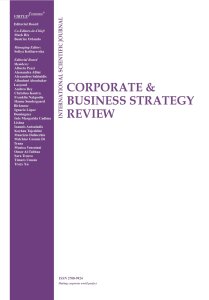New issue of the Corporate & Business Strategy Review journal

The editorial team is delighted to present the first issue of the journal “Corporate & Business Strategy Review” in 2024.
The articles published in the new issue of Corporate & Business Strategy Review invite the reader, with the help of numerous longitudinal case studies, through the lens of both qualitative and quantitative methodology, to reflect, learn and be informed about the processes of change and transformation of the corporate sector in emerging markets, which are taking place under the influence of accelerated development of disruptive technologies. The authors who sign these works come from Albania, Ethiopia, Hungary, India, Indonesia, Iraq, Jordan, Malaysia, Morocco, Nigeria, Pakistan, Peru, Saudi Arabia, Spain, Thailand and Vietnam.
In particular, the papers published in this issue investigate such relevant topics as corporate governance, business strategy, financial performance, financial markets, financial reporting, liquidity, accounting, public and private banks, green financing, ESG, green human resource management, environmental performance, profitability, artificial intelligence, internal and external audit, audit quality, audit committee decision, sustainable competitive advantage, chief executive officer duality, corporate social responsibility, mutual funds, chasing returns, investments, expected returns, asset pricing, stock market, governance mechanisms, innovative strategies, family business governance, socio economic development, equity trading strategies, financial engineering, social entrepreneurship, fiscal policy, insurance, internationalization, SMEs, strategic management, business management, enterprise development, digital economy, management accounting, revenues, education governance, customer satisfaction, etc.
The full issue of the journal is available at the following link .
In the first paper, Hala Ayyed Hadi and Hakeem Hammood Flayyih study the impact of accounting financial performance on the money market in the Iraqi economy.
Abdul Basyith, Fitriya Fauzi, and Lesi Agusria investigate the implementation of climate change policy, governance practices, and green financing and the impact of ESG, specifically on the environment.
Yarnaphat Shaengchart and Tanpat Kraiwanit aim to explain the impact of the SpaceX Starlink Satellite Project on global and local Internet providers.
Lindrianasari and Engkos Achmad Kuncoro provide empirical evidence regarding the influence of internal auditor capabilities in artificial intelligence on sustainable competitive advantage in large companies in Indonesia.
Nisreen Aljaloudy, Omar Mowafi, and Mahmoud AlKhalialeh examine empirically the association between surplus free cash flow and earnings management, and the moderating effect of governance on this relationship.
Nor Hadi, Jadzil Baihaqi, Ita Rakhmawati, and Udin Udin explore the obscuration of corporate social responsibility practices carried out by companies and their impacts on the ineffectiveness of social accounting.
Iriyadi, Meiryani, Ahmad Syamil, Reyhan Rifqi Naldo, Zaidi Mat Daud, Anderes Gui, Agung Purnomo, and Satria Fadil Persada aim to compare the performance of return-chasing investments with the buy-and-hold strategy in providing the best return to stock mutual fund investors.
Hussam Ali Mhaibes, Akram Salim Hasan Al-Janabi, and Sahraa Anwer Hussein try to build a model that enhances trust-building for public and private banks to compare and determine the significant differences between public and private banks.
Ntsieni Fitzgerald Ramasimu assesses the degree of innovative teaching practices by secondary school teachers in South Africa using a principal component analysis approach.
Sukarn Sharma approaches to identify passenger preferences for mobile app-based taxi services in Dehradun, India, to ensure sustainable business growth.
Ali Mansouri, Mouaad Chafai, and Nada Moufdi aim to open a debate on the theoretical approaches of corporate governance that researchers must mobilize while highlighting their main strengths and limitations when it comes to understanding the “family business” phenomenon.
Pham Dan Khanh, Le Quy Duong, and Pham Vu Anh analyze the performance of four famous multifactor asset pricing models: the capital asset pricing model, the Carhart four-factor model, and the Fama-French three-factor and five-factor models.
Bassey Ekpenyong Anam, Virginia Emmanuel Ironbar, Uno Agbor Ijim, Pius Otu Abang, Otu Offiong Duke, Felix Eja Ojong, Maxwell-Borjor Achuk Eba, Esther Esien-Cobham Uzoh, Felix Tabi Okorn, and Bisong Daniel Bisong estimate corporate social responsibility and poverty reduction programmes in the emerging market.
Nurul Jannah Abdullah, Intan Waheedah Othman, and Sharina Tajul Urus focus on the factors influencing the acceptance of mobile payment among working-age individuals in Malaysia.
Achuta Mukund Harsha and Vaddi Venkata Sundara Kesava Rao deal with the question of the effectiveness of three technical indicators, namely Simple moving average, On-balance volume, and Commodity channel index, in identifying profitable trading opportunities.
Shqipe Xhaferri, Ilindena Sotirofski, Albana Demi, Daniela Lika, and Flutura Domi deal with the relationship between social entrepreneurship and the social environment by analyzing public revenue, expenditure, fiscal policy, and the changes in minimum and maximum wages of public social contributions in Albania for the period 1999–2020.
Mohammad K. Shbeilat extends the literature by providing an experimental investigation of the main and interactive weights of factors influencing audit committee members’ decisions regarding external auditor selection.
Penpim Phuangsuwan, Supaprawat Siripipatthanakul, Pongsakorn Limna, and Nuttharin Pariwongkhuntorn explain the Google Maps application’s impact on Thailand’s digital economy.
Shulei Bi, Magdolna Sass, and Tamás Gáspár try to sort out the advantages, disadvantages, opportunities and threats faced by the D&H company and evaluate the internationalization paths and plans of this company.
Hung Hoang Dau, Nga Thi Tran, Quang Ngọc Pham, and Cung Huu Nguyen aim to promote the level of effective management accounting for revenue, costs, and business results.
Edmundo Lizarzaburu, Kurt Burneo Farfan, Maria Camacho, and Conrado Diego García-Gómez discuss the current literature on this management model and then analyze its applicability in business practice through a case study.
Nadia Abdelhamid Abdelmegeed Abdelwahed, Mohammed A. Al Doghan, and Bahadur Ali Soomro outline the connection between green human resource management and environmental performance directly and indirectly through employees’ eco-friendly behaviour, environmental values, and green passion.
We are grateful to all the scholars who have contributed to this issue, and we hope that you find this issue of the journal useful, informative and interesting!
















